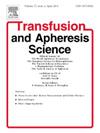Enhancing clinical insight: Implementing validated questionnaires for comprehensive assessment of clinician expertise in transfusion medicine practices
IF 1.4
4区 医学
Q4 HEMATOLOGY
引用次数: 0
Abstract
Background
Blood transfusion is a cornerstone of modern healthcare, pivotal in saving countless lives annually. However, inadequate knowledge among healthcare providers can lead to serious complications. Despite the availability of assessment tools like the Biomedical Excellence for Safer Transfusion (BEST) test, there is a need for indigenous-validated questionnaires to address knowledge gaps effectively. This study aimed to evaluate bedside transfusion medicine knowledge among clinical residents using a validated questionnaire, focusing on knowledge gaps.
Study design and methods
A cross-sectional study was conducted at a tertiary care referral center in Northern India. The questionnaire, developed based on national and international transfusion guidelines, was validated by an expert panel, and administered to 245 clinical residents. The questionnaire covered six domains related to transfusion medicine: blood component storage, blood bank procedures, transfusion-transmitted infections, administration of blood components, transfusion reactions, and transfusion practices.
Results
The study revealed varying levels of knowledge across specialties and residency years. Overall, residents scored 61 % in transfusion medicine knowledge, with Pediatrics residents demonstrating the highest scores. The incremental increase in knowledge from first to third-year residents underscores the value of continuous, experience-based learning throughout the residency period.
Discussion
Study highlights significant knowledge gaps in bedside transfusion practices among clinical residents, emphasizing the need for structured educational interventions. Tailored programs, integrated into undergraduate and postgraduate curricula, are essential to improve transfusion safety and patient outcomes. Addressing these gaps can lead to better bedside transfusion practices, reducing risks and improving the quality of patient care.
提高临床洞察力:采用有效问卷全面评估临床医生在输血医学实践中的专业知识。
背景:输血是现代医疗保健的基石,每年挽救无数人的生命。然而,医疗服务提供者对输血知识的缺乏会导致严重的并发症。尽管有生物医学卓越安全输血(BEST)测试等评估工具,但仍需要经过本土验证的问卷来有效解决知识差距问题。本研究旨在使用有效问卷评估临床住院医师的床旁输血医学知识,重点关注知识差距:在印度北部的一家三级医疗转诊中心开展了一项横断面研究。该问卷是根据国内和国际输血指南编制的,经专家小组验证,并对 245 名临床住院医师进行了问卷调查。问卷涉及输血医学的六个相关领域:血液成分储存、血库程序、输血传播感染、血液成分管理、输血反应和输血实践:研究显示,不同专业和不同住院医师年限的住院医师对输血知识的掌握程度各不相同。总体而言,住院医师在输血医学知识方面的得分率为 61%,其中儿科住院医师的得分率最高。从第一年到第三年,住院医师的知识水平逐步提高,这凸显了在整个住院医师培训期间持续进行以经验为基础的学习的价值:讨论:该研究强调了临床住院医师在床旁输血实践方面存在的巨大知识差距,强调了采取结构化教育干预措施的必要性。在本科生和研究生课程中融入量身定制的课程,对于改善输血安全和患者预后至关重要。弥补这些不足可改善床旁输血实践,降低风险并提高患者护理质量。
本文章由计算机程序翻译,如有差异,请以英文原文为准。
求助全文
约1分钟内获得全文
求助全文
来源期刊
CiteScore
3.60
自引率
5.30%
发文量
181
审稿时长
42 days
期刊介绍:
Transfusion and Apheresis Science brings comprehensive and up-to-date information to physicians and health care professionals involved in the rapidly changing fields of transfusion medicine, hemostasis and apheresis. The journal presents original articles relating to scientific and clinical studies in the areas of immunohematology, transfusion practice, bleeding and thrombotic disorders and both therapeutic and donor apheresis including hematopoietic stem cells. Topics covered include the collection and processing of blood, compatibility testing and guidelines for the use of blood products, as well as screening for and transmission of blood-borne diseases. All areas of apheresis - therapeutic and collection - are also addressed. We would like to specifically encourage allied health professionals in this area to submit manuscripts that relate to improved patient and donor care, technical aspects and educational issues.
Transfusion and Apheresis Science features a "Theme" section which includes, in each issue, a group of papers designed to review a specific topic of current importance in transfusion and hemostasis for the discussion of topical issues specific to apheresis and focuses on the operators'' viewpoint. Another section is "What''s Happening" which provides informal reporting of activities in the field. In addition, brief case reports and Letters to the Editor, as well as reviews of meetings and events of general interest, and a listing of recent patents make the journal a complete source of information for practitioners of transfusion, hemostasis and apheresis science. Immediate dissemination of important information is ensured by the commitment of Transfusion and Apheresis Science to rapid publication of both symposia and submitted papers.

 求助内容:
求助内容: 应助结果提醒方式:
应助结果提醒方式:


